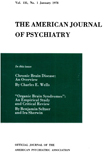STRESS, DEFENSES AND COPING BEHAVIOR: OBSERVATIONS IN PARENTS OF CHILDREN WITH MALIGNANT DISEASE
Abstract
Perhaps for too long a time, psychiatrists have drawn their conclusions about behavior from the study of "patients" or deviants. Research on reactions to stress situations attempts to redress this imbalance by paying attention also to persons who handle life's contingencies well. The present paper reports observations on the adaptional behavior of 46 parents of 27 children under treatment for leukemia or other malignant diseases, carried out over a period of approximately 2 years at the Clinical Center of the NIH.
Although each parent reacted to the stresses to which he was exposed in a unique and individual manner, a fairly uniform "natural history" of the sequence of adaptational techniques employed by the group as a whole could be observed and is summarized in the paper. The psychic instrumentalities responsible for the stages in this process are conceptualized as coping strategies which are either aided by personality defenses operating within an optimum range or interfered with by defenses when these are ineffective at one extreme of this range or are symptomatically obtrusive at the other. The various defenses employed are listed and described; the most important of these were isolation of affect, denial, and motor activity, and it is suggested that these may have broad application as "normal" defenses.
An important, and even urgent need of the parents was to encompass the tragic events unfolded before them within some broad framework of meaning comprehensible in terms of their experiences and beliefs. This "search for meaning," stemming from an inability to tolerate a world in which leukemia strikes a child without apparent rhyme or reason, took various forms such as seeking out some personal agency who could be blamed for the disease or placing it within the inscrutable significance of a religious scheme of things.
The process of anticipatory mourning (Lindemann), the gradual detachment of emotional investment from the child, was noted in most cases in which the course of illness was longer than 3 or 4 months, and resulted in a muting of the grief reaction so that the terminal phase and death of the child was often received with an attitude of "philosophical resignation." However, there appeared to be a reciprocal relationship between this process and unusually strong denial defenses, so that in parents in whom the latter were present, the reaction to the death and to post-mortem mourning was likely to be more distressing.
Access content
To read the fulltext, please use one of the options below to sign in or purchase access.- Personal login
- Institutional Login
- Sign in via OpenAthens
- Register for access
-
Please login/register if you wish to pair your device and check access availability.
Not a subscriber?
PsychiatryOnline subscription options offer access to the DSM-5 library, books, journals, CME, and patient resources. This all-in-one virtual library provides psychiatrists and mental health professionals with key resources for diagnosis, treatment, research, and professional development.
Need more help? PsychiatryOnline Customer Service may be reached by emailing [email protected] or by calling 800-368-5777 (in the U.S.) or 703-907-7322 (outside the U.S.).



